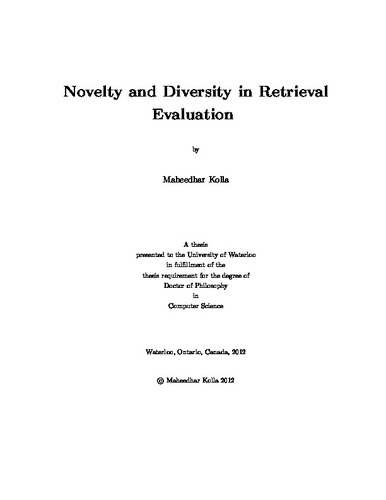| dc.description.abstract | Queries submitted to search engines rarely provide a complete and precise
description of a user's information need.
Most queries are ambiguous to some extent, having multiple interpretations.
For example, the seemingly unambiguous query ``tennis lessons'' might be submitted
by a user interested in attending classes in her neighborhood, seeking lessons
for her child, looking for online videos lessons, or planning to start a business
teaching tennis.
Search engines face the challenging task of satisfying different groups of users
having diverse information needs associated with a given query.
One solution is to optimize ranking functions to satisfy diverse sets of information
needs.
Unfortunately, existing evaluation frameworks do not support such optimization.
Instead, ranking functions are rewarded for satisfying the most likely intent
associated with a given query.
In this thesis, we propose a framework and associated evaluation metrics that are
capable of optimizing ranking functions to satisfy diverse information needs.
Our proposed measures explicitly reward those ranking functions capable of presenting
the user with information that is novel with respect to previously viewed
documents.
Our measures reflects quality of a ranking function by taking into account its
ability to satisfy diverse users submitting a query.
Moreover, the task of identifying and establishing test frameworks to compare
ranking functions on a web-scale can be tedious.
One reason for this problem is the dynamic nature of the web, where documents
are constantly added and updated, making it necessary for search engine developers
to seek additional human assessments.
Along with issues of novelty and diversity, we explore one approximate
approach to compare different ranking functions by overcoming the problem of
lacking complete human assessments.
We demonstrate that our approach is capable of accurately sorting ranking
functions based on their capability of satisfying diverse users, even in the
face of incomplete human assessments. | en |

